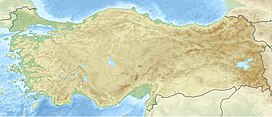Mount Harşena
| Mount Harşena | |
|---|---|
 Historical houses and rock tombs above Mount Harşena | |
| Highest point | |
| Elevation | 272 m (892 ft) |
| Listing | |
| Coordinates | 40°39′18″N 35°49′44″E / 40.65500°N 35.82889°E |
| Geography | |
| Location | Amasya Province, Turkey |
Mount Harşena (Turkish: Harşena Dağı), is a mountain located in Amasya, the capital of the Amasya Province of Turkey. It has a height of 272 m (892 ft). Mount Harşena was added to the tentative list in the cultural category of UNESCO World Heritage Site on 13 April 2015 alongside the tombs of the kings of Pontus.[1][2]
Amasya is located at an extremely important junction due to its location. Due to this feature, it has been governed by many states throughout history. Mount Harşena, located right next to the Yeşilırmak river passing through Amasya, has been inhabited for thousands of years. The settlement in the region dates back to the Early Bronze Age. After this period, the region came under Phrygian, Scythian, Persian, Pontus, Roman, Eastern Roman, Danishment, Ilkhanid, Seljuk and Ottoman domination.
History[edit]
The Kingdom of Pontus was founded in Amaseia (Amasya) in 281 BC by Mithridates I, one of the Persian satraps.[3][4] After Amaseia was declared the capital of Pontus, monumental tombs began to be built on Mount Harşena. The heights of these tombs vary between 8-15 meters. In the Maidens' Palace area, there are rock tombs belonging to five kings who reigned from the Founding King Mithridates I to Pharnaces I.[5]
References[edit]
- ^ "Mount Harşena and the Rock-tombs of the Pontic Kings". UNESCO - World Heritage Center. Retrieved 2016-09-28.
- ^ "Amasya Harşena Dağı Ve Pontus Kral Kaya Mezarları Unesco Dünya Miras Geçici Listesinde" (in Turkish). Kültür Varlıkları ve Müzeler Genel Müdürlüğü. Retrieved 2016-09-20.
- ^ McGing, B.C. (1986). The Foreign Policy of Mithridates VI Eupator, King of Pontus. BRILL. p. 15. ISBN 978-9004075917.
In 302 Mithridates II fell under suspicion of conspiring with Cassander against Antigonus and was killed near Cius. His son Mithridates III of Cius inherited the dynasty, but was warned by his friend Demetrius that he too was in danger from Antigonus and fled to Paphlagonia. Here he ruled for thirty six years (302-266) at some stage proclaiming himself Mithridates Ctistes, founder of the kingdom of Pontus and the line of Pontic kings.
- ^ Van Dam, Raymond (2002). Kingdom of Snow: Roman Rule and Greek Culture in Cappadocia. University of Pennsylvania Press. p. 17. ISBN 978-0812236811.
A Persian nobleman named Mithridates "the Founder" established himself as king of Pontus during the late fourth century B.C.
- ^ "Arşivlenmiş kopya". Archived from the original on 9 August 2016. Retrieved 7 August 2016.

